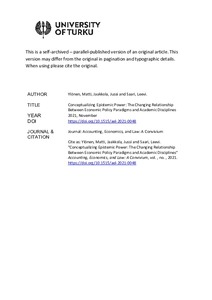Conceptualizing Epistemic Power: The Changing Relationship Between Economic Policy Paradigms and Academic Disciplines
Jaakkola Jussi; Saari Leevi; Ylönen Matti
https://urn.fi/URN:NBN:fi-fe2021120158358
Tiivistelmä
The ways in which epistemic foundations of academic disciplines shape policy paradigms have been an understudied area. We illustrate such dynamics by focusing on paradigm shifts between economics and legal scholarship. Our case study focuses on the evolution of the Finnish corporate tax policy between 1991 and 2014 to illuminate complex policy diffusion through professions. First, in 1993, Finnish corporate tax policy was aligned with the neoclassical ideas of the time in a lawyer-driven process. Second, in the early 2000s, initiatives from the EU and the OECD provided these lawyers a new epistemic source for broadening their argumentation. Third, in the 2010s, the disciplinary base shifted from legal studies to economics, which coincided with administrative reforms emphasizing quantitative impact assessments. These transformations completed the shift from legal scholarship to economics in tax policy design, paving way to the entrance of economic theoretical arguments to tax policy discussions. Our findings highlight five overlapping and mutually reinforcing factors that shape knowledge production in expert groups that influence economic policy: (1) the extent to which politicians rely on expertise; (2) the balance of power between academic disciplines in evidence-based policy-making; (3) the disciplinary base to which the dominant expert groups rely on; (4) the shifts in the epistemological, ontological and methodological mainstream within particular disciplines; and, (5v) the extent to which international organizations are seen as epistemic versus policy-driven authorities.
Kokoelmat
- Rinnakkaistallenteet [19207]
